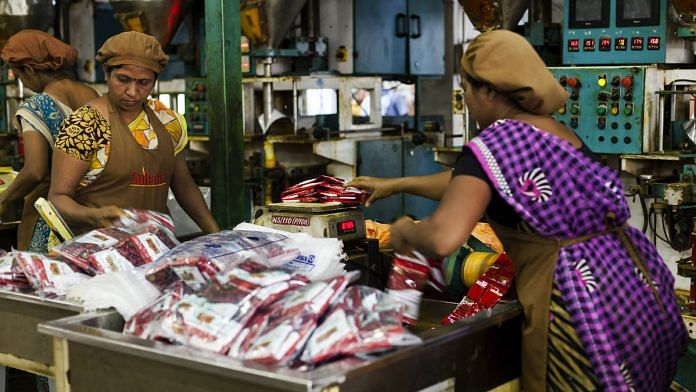New Delhi: Multiple compliances, large volume of paperwork and a hostile environment are some of the reasons behind the unease of owning small businesses in India, according to entrepreneurs in the country.
Several such entrepreneurs took to social media in the past two days to air their grievances on the difficulty of sustaining Micro, Small and Medium Enterprises (MSMEs) in India.
It started after Rakesh Nayak, an Indian-American entrepreneur, tweeted about how he was “deceived” about business opportunities in India.
“Unpopular opinion: After spending almost a month in India doing business, I have concluded one thing – the morons who gave me lectures on how India has developed digitally & become business-friendly recently are either jobless or never did any business or they are worth nothing,” tweeted Nayak Wednesday.
Unpopular opinion: After spending almost a month in India doing business, I have concluded one thing – the morons who gave me lectures on how India has developed digitally & become business-friendly recently are either jobless or never did any business or they are worth nothing.
— Rakesh Nayak (@OdiSriUS) September 7, 2021
Nayak’s tweet has since received over 19,500 likes and has been retweeted more than 4,000 times.
It has received over 500 replies and most of them are by entrepreneurs talking about the plethora of problems they have faced while setting up and maintaining businesses in the country.
One such tweet by Sandeep Manudhane, an entrepreneur who leads an educational website called PT Education, talked about how the burden of compliances have taken a toll on MSMEs.
“Other than giant corporates, most MSMEs are silently suffering the burden of compliances, even as business volumes are shrinking. No one speaks up out of fear and general reluctance,” said Manudhane.
Other than giant corporates, most MSMEs are silently suffering the burden of compliances, even as business volumes are shrinking. No one speaks up out of fear and general reluctance.
— Sandeep Manudhane (@sandeep_PT) September 8, 2021
Another user, Prashant Ray, an entrepreneur according to his Twitter bio, also noted that the burden of compliances falls on MSMEs, creating a divide between them and bigger corporations.
He also said that “digitization was a farce” since even after filing documents online, entrepreneurs have to approach government officials.
Burden of compliance is on MSME's bugger corporates are enjoying lesser tax.
Business for MSME has shrunk to alarming levels.
Digitization is a farce, you can submit everything online but in the end you need to visit the Govt officials. This is worse than earlier red tapism.
— Prashant (@RayPrashant_) September 8, 2021
Sanjeev Mehta, managing director of wellness products company Spa Ceylon, highlighted the travails of paperwork that a businessman has to endure in India.
“I spend most of my time getting returns filed, declarations filed etc etc. Very little time to grow the business. Not to speak of the costs,” he tweeted.
As a businessman running 2 MSMEs, I have been at the receiving end of the horrid paperwork and the complete myth of ease of doing business. I spend most of my time getting returns filed, declarations filed etc etc. Very little time to grow the business. Not to speak of the costs
— Sanjeev Mehta (@smehta777) September 8, 2021
Another user, Ritesh Uttamchandani, a photographer, also commented on excessive paperwork, saying “process is punishment and the govt loves paper”.
I feel your pain. As a photographer I worked a few times for the government. Less said the better. And now, my sister and I began a small catering thing and the FSSAI certification for all its digital wah wah, was misery. Here, process is punishment, and the govt loves paper! pic.twitter.com/rO1xCMbHcj
— Ritesh Uttamchandani (@photowallah) September 8, 2021
Meanwhile, Vilakshan Jakhu, a tech entrepreneur, posted a three-tweet thread on the problems faced by a company while filing GST.
According to Jakhu, a company has to pay GST on behalf of a client even if they haven’t received payment from the latter. In the event a company fails to pay the GST, the department allegedly cancels the company’s GST number.
The above is an verbatim example of Advertising company employing 20 people! All employees no salaries, Director booked for GST non-compliance, no hope to get the invoice paid now since GST number is invalid! Welcome to "new" India!
— Vilakshan Jakhu (@vjakhu) September 8, 2021
Also read: Ford to stop manufacturing cars in India, 4,000 jobs to be impacted
The Indian regulatory landscape
The grievances aired by the entrepreneurs on Twitter are not new. As reported earlier by ThePrint, the Indian regulatory landscape has 1,536 Acts, more than 69,233 compliances and 6,618 regulatory filings across the Centre and states for companies to follow.
According to TeamLease Compliance, a leading human resource company in India, firms have to deal with 677 Acts, 25,537 compliances and 2,282 regulatory filings at the central level alone. Meanwhile, states have their own Acts and compliances for companies.
This is despite an improvement in India’s ranking in the World Bank’s Ease of Doing Business list. From the 130th rank in 2016, India had been steadily improving on the list and reached the 63rd spot in 2020.
However, a 2018 study by American think tank, Centre for Global Development, had attributed India’s progress on the World Bank list to change in methodology and not actual reforms.
(Edited by Rachel John)
Also read: What RBI measures mean for vaccine makers, hospitals, individuals and MSMEs



